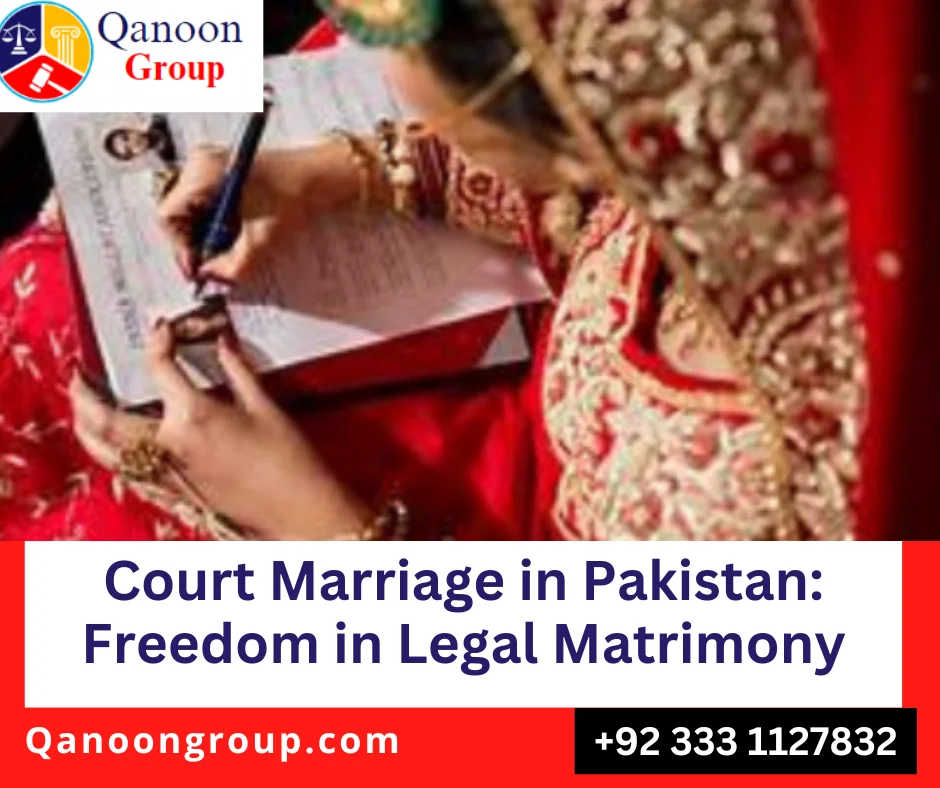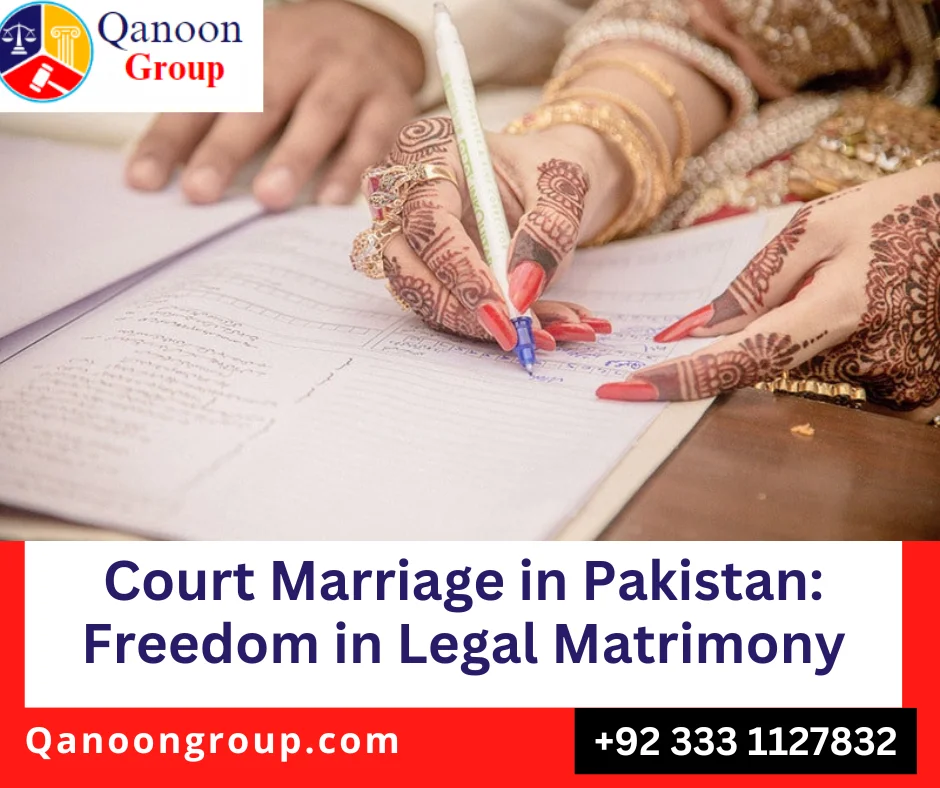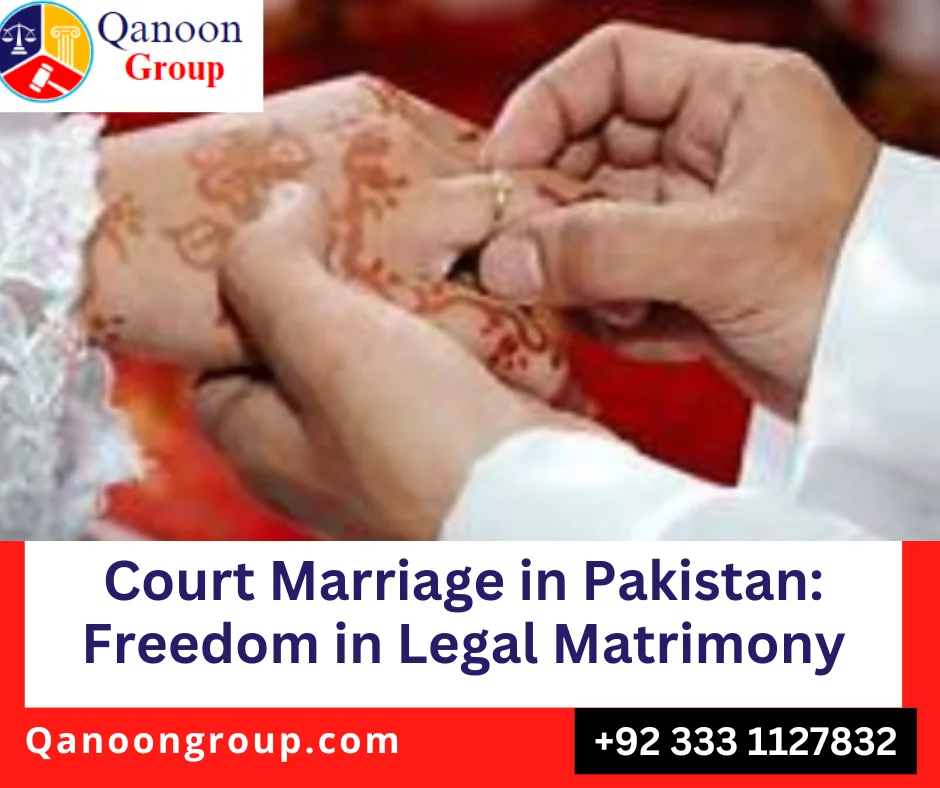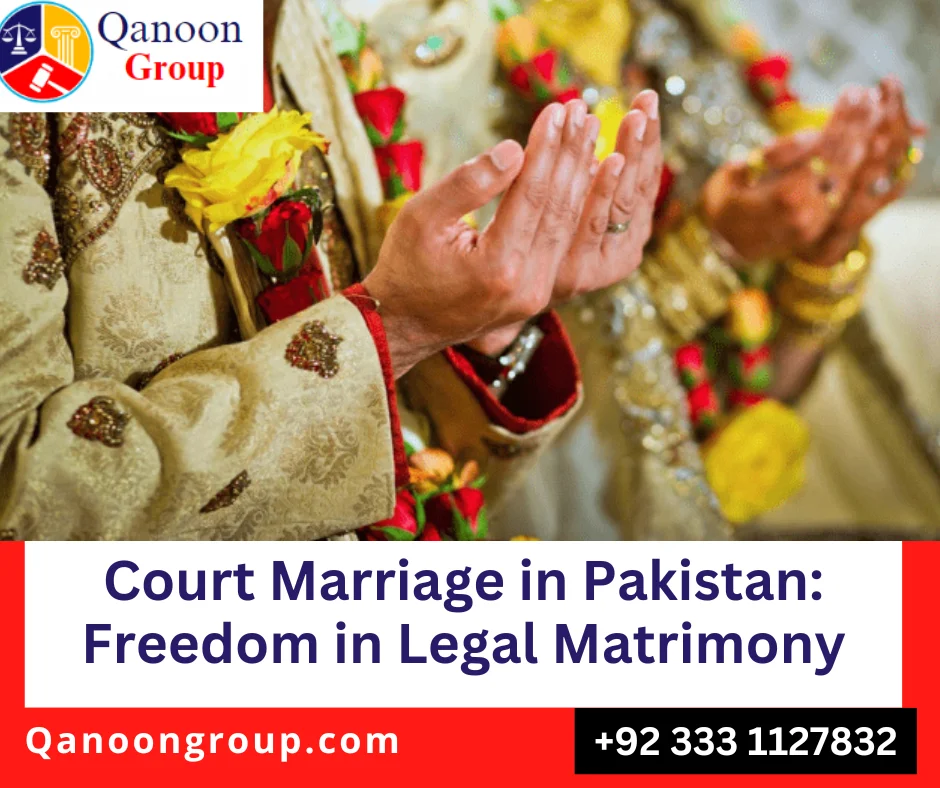Court Marriage in Pakistan: Freedom in Legal Matrimony
Court Marriage Laws Ordinance of 1961 in Pakistan
Marriage laws in Pakistan provide a legal framework for couples seeking to solemnize their union. The Muslim Family Laws Ordinance of 1961 governs marriage and Divorce among Muslims, while the Christian Marriage Act covers weddings within the Christian community. There are separate laws for Hindus and other minority groups. These laws outline requirements such as age limits, consent from guardians, and registration procedures to ensure the legality and validity of marriages in Pakistan. By understanding these laws, individuals can confidently navigate the process and embark on a journey towards wedded bliss.
REQUIRED DOCUMENTS FOR COURT MARRIAGE IN PAKISTAN
The process of court marriage in Pakistan is straightforward, requiring specific documents to ensure its legal validity. Below is a list of the essential documents needed for court marriage:
- Photostat Copies of CNICs: (Computerized National Identity Cards) plus six passport-size photographs of the bride and groom. The bride and groom must provide photocopies of their CNICs, demonstrating their identity and age.
- Alternative Age Verification: In cases where a CNIC is unavailable, an acceptable alternative is presenting a NADRA B Form or any relevant educational document like a matriculation certificate to confirm the age of the individuals.
- CNIC Copies of Two Witnesses: Two witnesses are required for the court marriage and should provide photocopies of their CNICs. If witnesses are unavailable, we can arrange witnesses on your behalf.
- Documents for Second Marriage: If either the bride or groom has previously been married, documents validating the dissolution of the previous marriage are necessary. This includes a divorce or death certificate from the former spouse. Additionally, if the groom’s first wife is still alive, a permission letter from the Union Council is required for the second marriage.
- Bride’s Affidavit of Free Will: An affidavit will be prepared to ensure the bride’s free will and consent, confirming her willingness to proceed with the marriage. We will assist you in handling this affidavit.
COURT MARRIAGE PROCEDURE FOR MUSLIMS
In Pakistan, court marriages follow a straightforward process, adhering to Islamic principles. In Pakistan, court marriages follow a straightforward process, adhering to Islamic principles prioritizing free will and consent. Here is a step-by-step procedure for court marriages.
- Advance Booking: Contact us at least one day in advance to facilitate the preparation of all necessary documents for your court marriage.
- Bride’s Free Will Affidavit: The bride will provide her statement in our office, affirming her free will and consent. Court marriages in Pakistan cannot proceed under any form of pressure, coercion, or compulsion.

STEP-BY-STEP COURT MARRIAGE PROCEDURE In PAKISTAN
- The couple arrives at our office at the scheduled time. Our Nikah Khawan and lawyer will be present to ensure a smooth process.
- Consult with our lawyer regarding dower/Maher and other matters safeguarding the couple’s rights.
- The Magistrate/Justice of Peace/notary public or oath commissioner will certify the bride’s affidavit of free will after the Nikah.
- The Nikah Khawan solemnizes the Nikah as per Islamic tradition, and the Nikah registrar registers the Nikah.
- The local Union Council will issue the Nadra Marriage Certificate later on your request for a nominal extra fee.
DOCUMENTS PROVIDED AFTER COURT MARRIAGE
Upon the successful completion of the court marriage procedure in Pakistan, we will provide you with the following documents to legally validate your marriage and ensure your family’s future security:
- The bride signed the original Affidavit of Free Will.
- Two original copies of your Nikah Nama (Marriage Contract).
- NADRA Computerized Marriage Certificate (Additional Fee Applies).
These documents are tangible proof of your legal and official marriage, offering protection and security for your family’s future endeavors.
Court Marriage: A Path to Freedom from Tradition in Pakistan
It is worth noting that court marriage in Pakistan offers an alternative path for couples who wish to bypass traditional customs or face obstacles due to interfaith relationships or societal pressures. This option allows them to marry freely under religiously neutral provisions governed by court marriage becoming increasingly popular among young couples, it’s essential to grasp the legalities before embarking on this unique matrimonial journey.
Court Marriage in Pakistan: Love vs. Arranged Marriage
Marriage is a sacred bond that brings two individuals together in the eternal embrace of love and commitment. In Pakistan, weddings are often classified into two categories: love and arranged. As the name suggests, love marriages involve couples who marry based on their personal affection and connection.
On the other hand, arranged marriages are orchestrated by families or matchmakers who believe in finding a suitable partner for their loved ones.


Court Marriage: Choose Their Life Partners
Court marriages defy societal norms and traditions by allowing individuals to choose their life partners based on mutual understanding and affection. It celebrates love transcending boundaries of caste, religion, or social status. While some argue it can be risky due to potential family clashes or cultural differences between partners, others believe true happiness lies in marrying someone you truly love.
Court Marriage: Choice in a Culture Marriages
Arranged marriages hold deep-rooted significance in Pakistani culture, where decisions regarding marriage are made collectively by families rather than solely by the individuals involved. They emphasize compatibility factors such as family background, financial stability, education level, and shared values. The belief is that these considerations will lead to long-lasting relationships built on trust and respect.
Court Marriage: Bridging Tradition and Modernity in Pakistan
In this diverse landscape of court marriage in Pakistan comes a blend of tradition with modernity – couples opting for court marriage as an alternative path towards legal matrimony. Whether choosing love over arrangement or seeking acceptance from both sides of their families through lawful means, court marriage allows them to embark on their journey together while abiding by the laws outlined in Pakistan’s constitution.
Court Marriage: A Guide to Tying the Knot
Getting married is a beautiful milestone in anyone’s life, and court marriage offers a convenient and efficient way for couples in Pakistan to legalize their union. If you’re considering this option, here’s a quick guide on how to navigate the process.
Court Marriage: Document Preparation and Application Process
It’s essential to gather all the necessary documents, such as copies of your CNICs (Computerized National Identity Cards), passport-sized photographs, and any other required paperwork. Next, visit your local district court or marriage registrar’s office to obtain an application form for court marriage. Fill out the form accurately with both parties’ personal information, addresses, and witnesses’ details. Once completed, apply along with all supporting documents at the designated counter.
Court Marriage: Waiting for the Hearing and Solemnization
After submitting your application, you’ll need to wait for a set date to be called before a magistrate or judge who will solemnize your wedding ceremony. Both parties must be present during this hearing, along with two adult witnesses who can testify about your relationship. The magistrate or judge will ask basic questions regarding consent and willingness to marry each other before declaring you legally wedded partners.

Rights and Benefits of Court Marriage
Court marriage, also known as offers numerous rights and benefits to couples who choose this path of legal matrimony. Court marriage provides equal rights to both partners regarding property ownership and inheritance. This ensures that each spouse is entitled to their fair share without discrimination or bias. Additionally, court marriages allow couples to make crucial financial, healthcare, and education decisions. They have the autonomy to manage their lives as a unit without interference from external sources.
Court Marriage: Legal Protection and Financial Benefits
Furthermore, court marriages provide legal protection and recognition of the union between two individuals. This means that spouses are entitled to certain financial benefits such as tax breaks and insurance coverage for both health and life policies. Court marriages also allow couples to sponsor each other for visas or immigration purposes if they belong to different nationalities or wish to live abroad together. These rights enable couples greater flexibility in building a life together while enjoying the privileges granted by law.
Court Marriage Confidential: Your Intimate Union Under Law
Court marriage, also known as offers couples a unique opportunity to solemnize their union in a private and intimate setting. It allows them to bypass traditional wedding ceremonies and rituals instead of focusing on their marriage’s legal aspects.
Court Marriage: Ensuring Privacy and Legal Recognition
In this confidential arrangement, couples can exchange vows before a judge or magistrate, ensuring their union is legally recognized. This discrete approach ensures that the couple’s details remain undisclosed and protected from unnecessary public scrutiny. Court marriage provides privacy and freedom for couples who value their intimacy above societal expectations.
Court Marriage Paper: A Vital Document for Legal Unions
In the context of marriage in Islam, the Court Marriage Paper is a vital document, weaving together matrimonial commitment’s spiritual and legal dimensions. It plays a crucial role in formalizing unions, acting as tangible proof of a lawful marriage in the eyes of religious principles and legal frameworks. This document serves as a cornerstone, certifying the legitimacy of the marital bond and providing couples with a recognized status within the broader societal and legal context. As an essential component of matrimonial validation, the Court Marriage Paper solidifies the sacred covenant of marriage, ensuring its acknowledgment within the parameters of Islamic teachings and legal mandates.
The Legal Framework: Court Marriage Paper Requirements
Embarking on the journey of marital bliss within Islam necessitates a meticulous understanding of the legal framework, particularly the Court Marriage Paper requirements. Rooted in Islamic jurisprudence, these requirements are the foundation for a legitimate union. The process involves adherence to specific guidelines, ensuring that the Court Marriage Paper aligns seamlessly with Islamic principles and legal mandates, offering couples a secure and recognized foundation for their life together.


Court Marriage Paper: The Legal Seal of Matrimony
Within the realm of Islam, the Court Marriage Paper assumes the role of a legal seal, certifying the matrimonial bond. It carries the weight of religious validation and legal recognition, merging the sacred and the secular in a harmonious union. This document serves as a testament to the couple’s commitment to each other and their adherence to the principles outlined in Islamic law, providing a tangible and irrefutable record of their matrimonial journey.
Court Marriage Paper: Your Passport to Legal Matrimony
Considered the passport to legal matrimony in Islamic tradition, the Court Marriage Paper acts as an entry into the realm of recognized unions. By securing this document, couples in adherence to Islamic principles attain the validation of their marriage in the eyes of the law. This legal passport safeguards their rights and ensures their commitment is acknowledged and respected within the broader societal and legal context.
Court Marriage Paper in Pakistan: Documenting Love within Legal Boundaries
In the context of Pakistan, where Islamic principles hold sway, obtaining a Court Marriage Paper becomes paramount for documenting love within legal boundaries. This paper not only adheres to the tenets of Islam but also navigates the country’s legal landscape, offering couples a secure foundation for their union. It becomes a testament to their religious and legal commitment to ensuring that their love story is recorded within the recognized parameters of Pakistani law.
A Step-by-Step Guide to Court Marriage Paper in Pakistan
Navigating marriage in Islam involves a meticulous journey, particularly when considering the formalities of a Court Marriage Paper in Pakistan. This step-by-step guide is designed to demystify the process, providing couples with a clear roadmap to legalize their union following Islamic principles and Pakistani law. From understanding the prerequisites to completing essential documentation, each stage ensures that the sacred commitment between partners aligns seamlessly with religious and legal requirements. This comprehensive guide not only simplifies the procedural aspects but also emphasizes the significance of upholding the sanctity of marriage within the framework of Islamic traditions and legal mandates.
Essential Guidelines for Completing Court Marriage Paper
Completing the Court Marriage Paper involves adherence to essential guidelines that encapsulate both the sanctity of Islamic unions and the legal requisites of the process. These guidelines serve as a roadmap, ensuring every detail is meticulously addressed, and all necessary documents are provided. By following these guidelines, couples fulfill the legal requirements and reinforce the sacredness of their commitment within the framework of Islamic matrimony.
A Legal Affair: Understanding Court Marriage Paper
Delving into the realm of Court Marriage Paper is an exploration of a legal affair deeply rooted in Islamic principles. This document is not merely a bureaucratic requirement; it symbolizes the convergence of legal and spiritual dimensions in the context of marriage within Islam. Understanding the intricacies of the Court Marriage Paper unveils its profound significance in aligning the sacred commitment of marriage with the legal obligations dictated by Islamic teachings and the broader legal framework.


The Road to Legal Matrimony: Court Marriage Paper Explained
Embarking on the road to legal matrimony within the context of Islam involves a thorough understanding of the intricacies of the Court Marriage Paper. This document serves as a guide, steering couples through the legal intricacies while upholding the principles of Islamic matrimony. As explained in detail, the Court Marriage Paper becomes more than a formality; it transforms into a crucial instrument that ensures the recognition of the marital union in the eyes of both Islamic law and the broader legal landscape.
Specific Instructions In Court Marriage
Remember that each form may have specific instructions or additional sections that must be filled out based on your unique circumstances. Take your time filling out Court marriage forms, and seek assistance if needed. By following these steps diligently and paying attention to detail while filling out court marriage forms, you can ensure a smooth process toward legalizing your union without any unnecessary delays or complications.
Birth Certificates:
Obtaining a birth certificate is relatively straightforward. You can usually request a copy from the vital records office in the state or country where you were born. Make sure to gather all necessary information beforehand, such as your full name, date of birth, and parents’ names. Remember to double-check that all details are accurate before submitting your application!
Identity Proof:
It’s important to ensure that the name on your identity proof matches the name you intend to use for your court marriage. If there are any discrepancies, it may lead to delays or complications during the registration process. Therefore, double-checking all the details on your identity proof is essential before submitting your court marriage paper. Remember that having valid and accurate identity proof not only streamlines the court marriage process but also ensures that you are legally recognized as a married couple. So ensure you have this critical document ready when applying for court marriage!
The Court Marriage Process is Handling Legal Delays
One of the common challenges that couples may encounter during the court marriage process is legal delays. These delays can be frustrating and can prolong the overall timeframe for completing your court marriage. However, it’s important to stay patient and persistent to navigate these obstacles successfully.
If you find yourself facing a delay, here are some steps you can take:
1. Stay informed: Keep in touch with the marriage registration authorities or your lawyer for updates on your case status.
2. Follow up regularly: Don’t hesitate to follow up with relevant authorities regarding any pending paperwork or processes.
3. Seek professional assistance: If you’re facing significant delays or encountering repeated hurdles, consider seeking advice from a lawyer specializing in family law and court marriages.
4. Maintain clear communication: If there are any changes or updates related to your case, ensure both parties communicate effectively with each other and the concerned authorities.
While legal delays may be frustrating, they are not uncommon when dealing with bureaucratic procedures like court marriages. By staying vigilant and proactive throughout this process, you’ll increase your chances of overcoming these setbacks efficiently.
Along the way – such as documentation errors, family oppositions, or even legal delays – you’ll be equipped for a smooth journey towards officializing your marriage.
